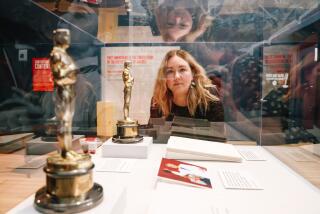Moving Viewers Beyond Camels, Sand Dunes : Museum: Paul Nance, who displays a collection of Arab artifacts on a Missouri farm, says we must look at a society as a whole before judging it.
- Share via
LONE JACK, Mo. — Most of Paul Nance’s neighbors in this western Missouri town of 392 grow wheat, alfalfa, hay or other crops over acre after acre of softly rolling hills.
Nance, a white-haired, 66-year-old with a piercing stare and a gentle laugh, has some grains planted on his 120-acre spread, but his farm’s raison d’etre is the cultivation of something else entirely: better understanding of the Arab world.
His chief tool is a 2,250-square-foot museum of Arab culture and artifacts, contained within a steel-frame shed at one end of the farm. Besides providing tours to anyone with the interest and an appointment who happens to pass through Lone Jack, which is about 100 miles south of Kansas City, Nance loans portions of his collection to colleges, universities and numerous traveling exhibits such as “The Gulf Arab States: Beyond Camels, Oil and the Sand Dunes,” opening tonight at the Placentia Library (see accompanying story.)
For Nance, all this is no mere hobby. The museum he and his wife, Colleen, opened in 1985 is a product of 31 years he spent in the Middle East with the Arabian American Oil Co. The firm’s director of policy and planning, Nance watched, largely from Aramco headquarters in Saudi Arabia, that section of the world transform itself from a mostly feudal Third World society to major player in world
events.
Upon his retirement in 1983, the Nances decided to find ways to share their vast collection of books, paintings, photographs, clothing, coffee-making implements, art objects and other accouterments of Arab life past and present.
The museum includes a 22-by-55-foot Bedouin goat-hair tent that stretches across the width of the shed. It houses all the items a Bedouin family would use in daily life in the desert, from utensils and clothing to incense burners and prayer rugs. Most of it was collected by the Nances personally, but since their return to the United States, they’ve received numerous donations from others who have lived and worked in the region. Nance has also been granted ongoing access to a wide range of historical materials from Aramco as well as from Saudi and Kuwaiti embassies.
The Nance Museum, a nonprofit, private foundation, “has one of the most comprehensive collections on Saudi Arabia in the United States,” according to an official at the Saudi Arabian Embassy in Washington. The exhibit also touches on some aspects of most other Arab nations. The Middle East of the 19th Century is documented thoroughly in a prized set of lithographs made in 1838-39 by Scottish artist David Roberts, many of which are on display.
Nance also gives up to 100 peeches each year at conferences and other events as a specialist in the oil business and American-Arab relations. As he sees it, “no one will ever again be able to spend three decades in that part of the world and take part in developing a national industry. It was a unique opportunity I had at that point in time.”
It’s not exactly what Nance expected when he went to work for Aramco in 1952 for what he thought would only be a few years while he continued work on a master’s degree.
But once in Saudi Arabia, as one of thousands of U.S. oil company employees sent to set up the business that has since largely been assumed by Saudis, Nance found himself drawn to the people, their religion and culture.
“We have seen the development of a people who have survived in a harsh environment (and who are) fiercely individualistic, family-oriented . . . generous and hospitable,” said Nance, who holds a degree in psychology and philosophy. “(In) little more than three decades, (they) have found a way to retain their values from their Islamic religion and the Bedouin customs, unchanged for centuries, integrated into a modern civilization.”
To Americans who got their first significant exposure to this closed society during the Persian Gulf War, and who criticized the Saudis’ treatment of women, Nance insists that it is important to look at the society as a whole before rendering judgment.
“We have seen no other culture in the world more committed to preserving (its) heritage and living its principles and obligations in everyday life, or more successful (at avoiding) crime, drugs, economic deprivation, abuse of children, homeless and elderly and other ills of social change,” he said.
Saudi Arabia, he continued, “was a great place to raise a family.” He and his wife have two sons.
“Very early on,” he recalled, “I decided I didn’t want to go to tourist traps on vacations. We visited more than 500 major museums and archeological sites, something my family shared.”
After leaving Aramco, Nance served as planning coordinator on the $30-million Saudi museum in Dhahran devoted to Saudi culture, science and technology as related to the oil industry. He has spent the last several years alternating between a winter home in Ft. Worth and summers in Lone Jack, on land not far from the Lawson, Mo., farm where he was born and raised.
Reflecting on the time and effort he has put into the museum over the last decade, Nance said, “I see this as a mid-career change rather than retirement.”
“Gulf Arab States: Beyond Camels, Oil and the Sand Dunes” will be on display at the Placentia Library, 411 E. Chapman Ave., today through Sept. 30. Library hours are Monday through Thursday, 10 a.m. to 8:45 p.m.; Friday and Saturday, 10 a.m. to 5:45 p.m.; Sunday, 1 to 4:45 p.m. At 6:30 p.m. Saturday, anthropologist Fadwa El Guindi will speak on the role of women in the gulf states and show excerpts of her film “El Sebou.” Information: (714) 528-1906.
More to Read
The biggest entertainment stories
Get our big stories about Hollywood, film, television, music, arts, culture and more right in your inbox as soon as they publish.
You may occasionally receive promotional content from the Los Angeles Times.










